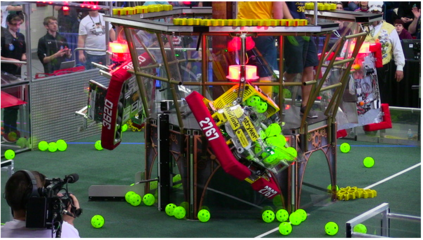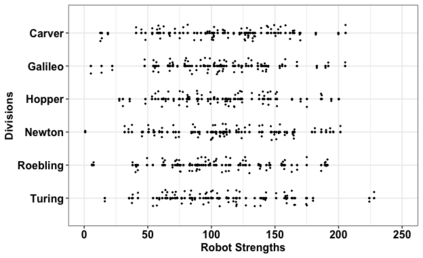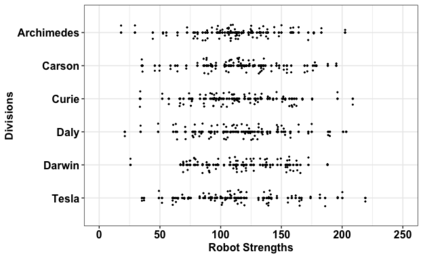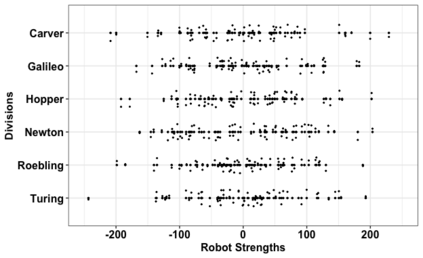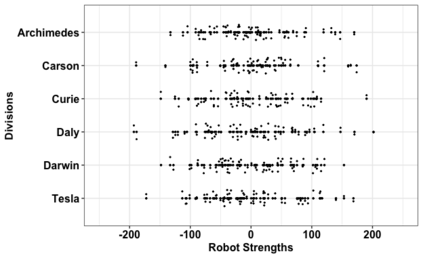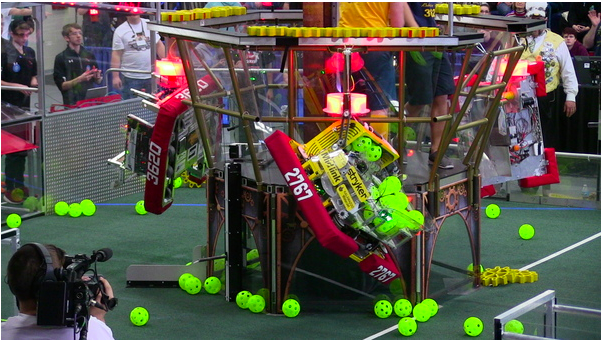Since the inception of the FIRST Robotics Competition (FRC) and its special playoff system, robotics teams have longed to appropriately quantify the strengths of their designed robots. The FRC includes a playground draft-like phase (alliance selection), arguably the most game-changing part of the competition, in which the top-8 robotics teams in a tournament based on the FRC's ranking system assess potential alliance members for the opportunity of partnering in a playoff stage. In such a three-versus-three competition, several measures and models have been used to characterize actual or relative robot strengths. However, existing models are found to have poor predictive performance due to their imprecise estimates of robot strengths caused by a small ratio of the number of observations to the number of robots. A more general regression model with latent clusters of robot strengths is, thus, proposed to enhance their predictive capacities. Two effective estimation procedures are further developed to simultaneously estimate the number of clusters, clusters of robots, and robot strengths. Meanwhile, some measures are used to assess the predictive ability of competing models, the agreement between published FRC measures of strength and model-based robot strengths of all, playoff, and FRC top-8 robots, and the agreement between FRC top-8 robots and model-based top robots. Moreover, the stability of estimated robot strengths and accuracies is investigated to determine whether the scheduled matches are excessive or insufficient. In the analysis of qualification data from the 2018 FRC Houston and Detroit championships, the predictive ability of our model is also shown to be significantly better than those of existing models. Teams who adopt the new model can now appropriately rank their preferences for playoff alliance partners with greater predictive capability than before.
翻译:自第一次机器人竞赛(FRC)及其特殊的决赛系统开始以来,机器人团队一直渴望适当量化其设计机器人的优势。 机器人团队包括一个游乐场类预选阶段(联盟选择),可以说是比赛中最游戏变化最大的部分,在比赛中,根据FRC的排名系统评估潜在联盟成员在决赛阶段建立伙伴关系的机会。在这种三对三的竞争中,已经使用了若干措施和模型来描述实际或相对机器人实力的特点。然而,现有模型现在的预测性性性能较差,因为对机器人实力的精确估计来自对机器人数量的观察的一小部分(联盟选择 ) 。 因此,在比赛中,根据FRC的排名系统排名系统评估8级机器人团队对潜在联盟进行更普遍的回归性模型,同时估计在决赛阶段建立伙伴关系的组合、机器人的组合和机器人优势。 同时,采用一些措施来评估竞争模型的预测性能力,公布FRC的实力和模型性能的模型性能与模型性能的精确性能不准确性评估。 FRC的顶级和机器人的顶级分析能力是所有机组的高级机组的精度和最高级的精度评估。

